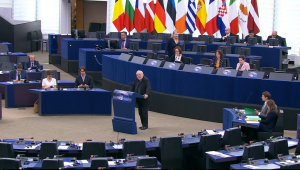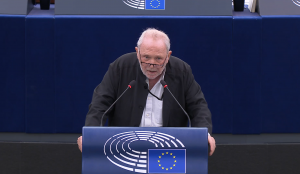There is no real East-West divide, according to MEP Bernard Guetta.
Interview published in Hungarian in the newspaper Magyar Nemzet and on magyarnemzet.hu on 4 December 2019, by Tamara Judi.
It is a rare thing, even among Hungarian Members of the European Parliament (MEPs), to write, in the name of transparency, a blog about the union’s activities in Hungarian. The liberal group’s French MEP Bernard Guetta, however, keeps a website in Hungarian, Polish, German, English and of course in French, saying: he does not want to talk about an East-West divide, and also, the European Union will surely be able to preserve its unity in the future. Mr Guetta – half-brother to the world-famous DJ, David Guetta – talked to this newspaper about the relation between Viktor Orbán and Emmanuel Macron, and about the NATO summit currently underway.
“Oh, this is a very old story!” – he begins when I ask him about the first time he went to Hungary. He first visited our country at the time of the 20th anniversary of the 1956 revolution, in 1976, as a journalist, and he returned several times since then: “I like your country and the Hungarian cuisine, too.” The MEP, who has won a mandate on Emmanuel Macron’s election list but puts himself ideologically to the centre-left, is much less fond of Prime Minister Viktor Orbán, whom he takes for a cynical politician.
“His European policies are contradictory” – the 68-year-old politician explains, hypothesizing that a state leader who stands for a common defence policy obviously cannot reject political union, as the two go hand in hand. He is only smiling at the assumption that following this logic, President Emmanuel Macron can also be contradictory, because he proclaims himself to be the great reformer of the European Union, yet speaks up against enlargement. “I don’t agree!” – Bernard Guetta insists.
Next, the relation between Viktor Orbán and Emmanuel Macron comes up. Last week, Manfred Weber, the parliamentary group leader of the European People’s Party publicly mused over the question: how come that suddenly the Hungarian and the French leaders get on so well with each other, whereas the May EP elections were announced as the choice between the Europe of Orbán and the Europe of Macron.
“The situation is much more complex than that” – Bernard Guetta comments on Mr Weber’s theory. According to him, although Orbán and Macron represent two totally opposite points of view in the question of liberalism and illiberalism, a number of European issues – for example the said common defence policy – still bind them together.
“And I know that President Macron takes Mr Orbán to be one of, if not the most clever European leader” – he says, adding that there is a “chemistry” between the two men, politically speaking.
He goes on about the Hungarian prime minister, saying: he thinks Viktor Orbán is very much aware of the fact that the United States under Donald Trump’s leadership is no more a rock solid ally to Europe, therefore, the NATO must be provided with a stronger European basis. “It would be too much of an investment for any single member state to make, so we must take care of our defence together – he explains. – Of course, it would be great if the United States and Europe reformed the NATO together” – he continues, repeating that it all depends on Donald Trump’s potential reelection.
“I am not too optimistic, either” – he answers when I ask him about the French President’s controversial opinion that “the NATO is brain dead”. Although he thinks the fate of the military bloc is clouded, Bernard Guetta is much more hopeful when it comes to the future of the European Union.
“Europe will certainly preserve its unity. Because, I don’t think that there is a real East-West divide; the same political divisions describe all the member states” – the centre-left politician points out, then remarks: in time, even Viktor Orbán’s opinion can change, in several European questions.
The Hungarian inquiry
Bernard Guetta’s book L’enquête hongroise (“The Hungarian inquiry”) was published last spring. In the book, he analyses the political developments of Austria, Italy and Poland, and he draws a parallel between their right-wing – in Italy’s case, formerly right-wing – leaderships. The MEP assumes a continuity in how this part of Europe, mostly the former territories of the Austro-Hungarian Empire, turned their backs on liberalism. Be it their position on migration, the rights of homosexuals or the political union, he thinks that these member states share similar views.




